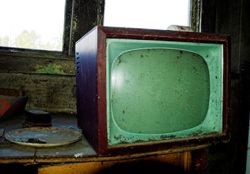Did Facebook Kill Television?
Mar 4th, 2009 | By James Lewin | Category: Citizen Media, Internet TV, Video  Paul Graham has published an interesting post that looks at Why TV Lost, arguing that the Internet, especially sites like Facebook, have “killed TV”.
Paul Graham has published an interesting post that looks at Why TV Lost, arguing that the Internet, especially sites like Facebook, have “killed TV”.
He highlights four reasons for this:
- The Internet is an open platform. Anyone can build whatever they want on it, and the market picks the winners. So innovation happens at hacker speeds instead of big company speeds.
- Moore’s Law, which has worked its usual magic on Internet bandwidth.
- Piracy. Users prefer it not just because it’s free, but because it’s more convenient. Bittorrent and YouTube have already trained a new generation of viewers that the place to watch shows is on a computer screen.
- Social applications. The average teenage kid has a pretty much infinite capacity for talking to their friends. But they can’t physically be with them all the time. When I was in high school the solution was the telephone. Now it’s social networks, multiplayer games, and various messaging applications. The way you reach them all is through a computer.
While Graham’s case is certainly interesting, it’s got two significant flaws:
- People are watching more TV than ever – we reported last month that the Internet is turning us into mouse potatoes. People aren’t just moving their viewing to the Internet, they are watching more video on all platforms than ever before.
- User generated media changes the economics of media – television’s traditional economic model is based on scarcity, and getting as many people as possible to watch expensive content. User-generated media means that the Internet offers practically infinite content options, and indie media producers, working from their bedrooms, garages and backyards, now challenge mainstream media for views and page views.
What do you think? Is television as we know it dead? If so, did Facebook kill it, or is television a victim of podcasts & Youtube?
Update: Rocketboom’s Andrew Baron offers his thoughts on this.
Image: gelund
Remember “Gin, Television and Social Surplus” by Clay Shirky: http://www.herecomeseverybody.org/2008/04/looking-for-the-mouse.html
According to a loose interpretation of the first half of the speech, TV operates as a “meanwhile” heatsink for our minds. Now that we have tons of stuff to do and create upon, TV becomes more and more irrelevant and flat.